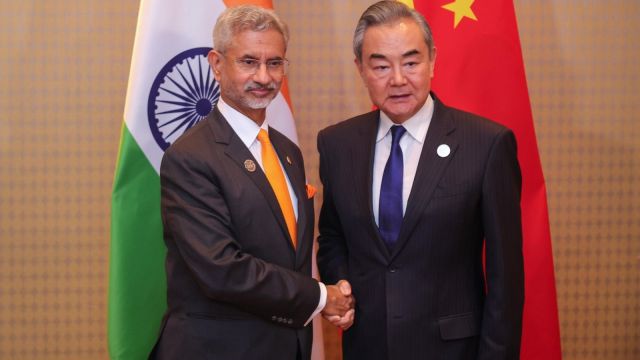A month after India and China agreed to disengage at two friction points along the Line of Actual Control leading to a meeting between Prime Minister Narendra Modi and Chinese President Xi Jinping in Russia, External Affairs Minister S Jaishankar and his Chinese counterpart Wangi Yi discussed the “next steps in India-China relations” that include “resumption of the Kailash Mansarovar Yatra pilgrimage, data sharing on trans-border rivers, direct flights between India and China and media exchanges”.
Meeting on the sidelines of the G20 Summit in Rio de Janeiro in Brazil, the two ministers also agreed that a meeting of the Special Representatives and of the Foreign Secretary-Vice Minister mechanism will take place soon.

Jaishankar, in a post, said, “On the sidelines of the G20 Summit in Rio, met CPC Politburo member and FM Wang Yi of China.”
Story continues below this ad
“We noted the progress in the recent disengagement in the India-China border areas. And exchanged views on the next steps in our bilateral ties,” he said, adding they “also discussed the global situation”.
The Chinese readout of the meeting said the two sides are planning to commemorate the 75th anniversary of India-China diplomatic ties and hold events in both countries.
Jaishankar is accompanying Modi for the Summit in Rio.
The Ministry of External Affairs said, “The ministers recognised that the disengagement in our border areas had contributed to the maintenance of peace and tranquillity. The discussions focused on the next steps in India-China relations. It was agreed that a meeting of the Special Representatives and of the Foreign Secretary-Vice Minister mechanism will take place soon.”
“Among the steps discussed were the resumption of the Kailash Mansarovar Yatra pilgrimage, data sharing on trans-border rivers, direct flights between India and China and media exchanges,” the MEA said.
Story continues below this ad
“On the global situation and international issues, EAM (External Affairs Minister) noted that India and China have both differences and convergences. We have worked constructively in the BRICS and the SCO framework. Our cooperation in the G20 has also been evident,” it said.
“Jaishankar said that we are strongly committed to a multipolar world, including a multipolar Asia. Where India is concerned, its foreign policy has been principled and consistent, marked by independent thought and action. We are against unilateral approaches to establish dominance. India does not view its relationships through the prism of other nations.”
“FM Wang Yi concurred with EAM that India-China relations have particular salience in world politics. He noted that our leaders had agreed in Kazan (Russia) on the way forward. The two ministers felt it was imperative that the focus should be on stabilising ties, managing differences and taking the next steps,” the MEA said.
At the beginning of the meeting, Jaishankar told Wang: “In Kazan, our leaders reached a consensus on taking next steps on our relationship, bearing in mind the understanding of 21 October. I am glad to note that on the ground, the implementation of that understanding has proceeded as planned. Our leaders have directed that the Foreign Ministers and the Special Representatives should meet at an early date. Some progress, some discussions have happened in that direction. Today, I am looking forward to discussing with you the next steps as envisaged by our leaders.”
Story continues below this ad
Last month, on October 21, India and China reached an agreement on patrolling arrangements in the Depsang Plains and Demchok, two friction points along the LAC. The announcement of the agreement set the stage for a meeting between Modi and Xi on the sidelines of the BRICS Summit in Kazan.
The two sides completed the process of disengagement at the two friction points and Indian troops resumed patrolling. It’s an important step in the three-step process: disengagement, de-escalation and de-induction of troops.









